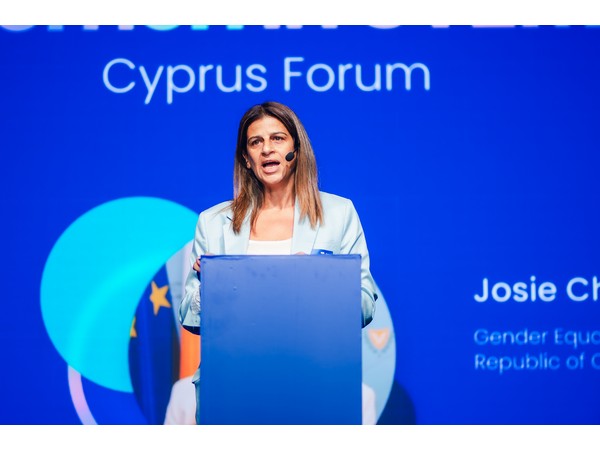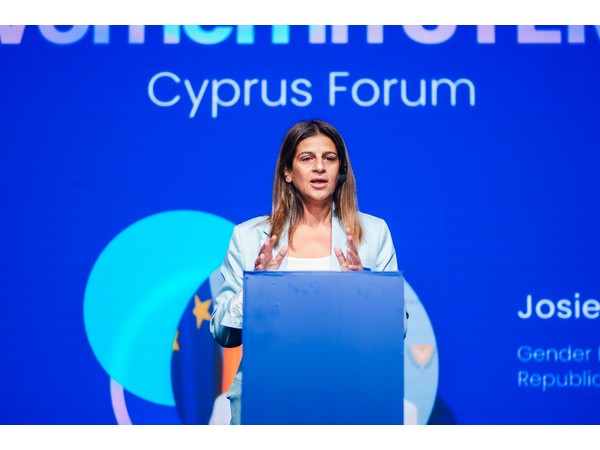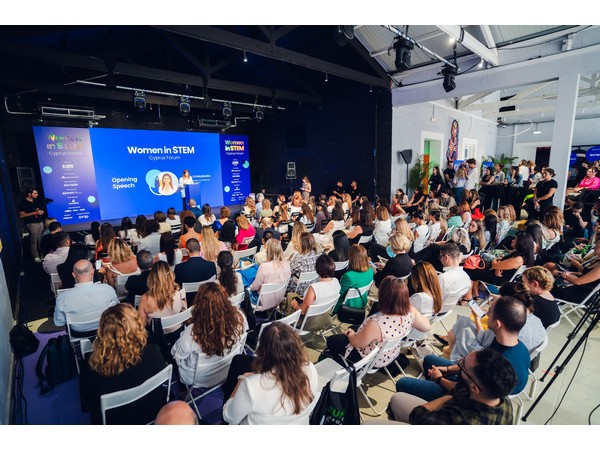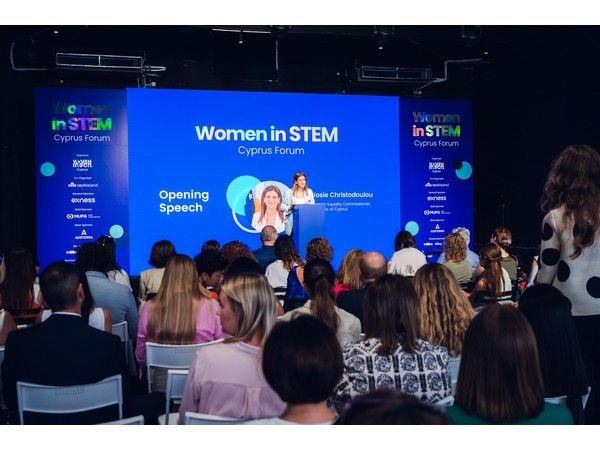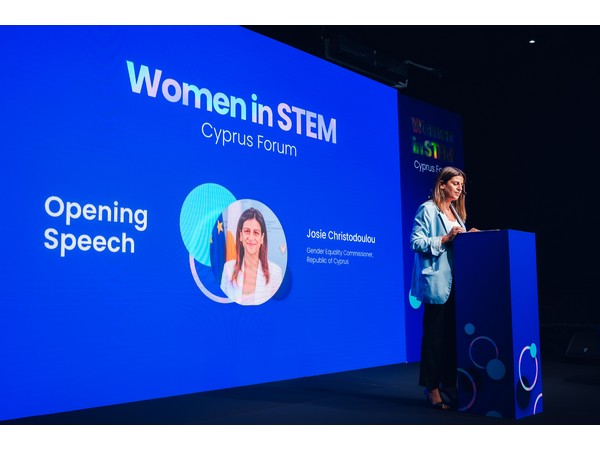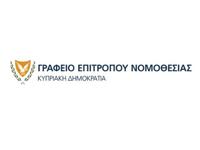Press Releases
08-10-2024 19:59
Opening speech by the Commissioner of Gender Equality of the Republic of Cyprus, Ms Josie Christodoulou, at Women in STEM, Cyprus Forum
On behalf of the President of the Republic of Cyprus, Mr Nikos Christodoulides, who could not be here with us today, I would like to congratulate you for organising this event, which reflects the importance of women’s participation in STEM and contributes to the joint effort towards gender equality.
Dear Tanya, dear Valentino, thank you for the ongoing partnership and for sharing the same vision. When the state meets the private sector, we can have substantial results.
Allow me to begin my speech differently today:
Ada Lovelace, whom we celebrate today, writes the first algorithm for a machine in mid eighteen hundreds (1800s) and is considered the first computer programmer.
2024 – Secretary-General of the United Nations (UN), Antonio Guterres, underlines that we will need 300 years to achieve gender equality. In Europe, the region which scores best on gender equality will need 100 years. In the meantime:
1945 – Harvard Medical School admits women for the 1st time.
1957 – Ireland gives women the right to property.
1971 – Women get the right to vote in Switzerland.
2003 – Marital rape becomes illegal in the UK.
Going back to the 1948 Declaration of Universal Human Rights, Hansa Mehta and Eleonor Roosevelt change Article 1 just before it was voted. From “all men are born free and equal” to “all human beings are free and equal”, recognising in this respect, on a universal level, that women are human beings.
2023 – Cyprus ranks 21 amongst European Union (EU) member states when it comes to gender equality. The 2024 UN report on Gender Equality and Sustainable Development Goals (SDGs) ranks Cyprus 39th across the world, noting that there is a steady progress towards reaching the 2030 goals. The World Economic Forum report 2024 upgraded Cyprus to the 86th place from the 106th.
There is a long way until we reach substantial gender equality. At the same time, these reports and indexes should never be seen as competition between states. No country has achieved gender equality. We must use these reports as tools to improve the daily lives of both women and men as it is not about competition between women and men either. It is a matter of investing in and use of the different skills and experiences of both women and men to build stronger economies and fairer, democratic societies. I only underline the above because I am often asked why are we even discussing gender equality or what is the problem if we have no women in STEM?
According to the European Institute of Gender Equality, about half of EU students graduate in two main fields of education. In both of them, the absence of one gender is striking.
Almost 24% of students graduate in STEM subjects and most of them are men. For example, in the Information and Communications Technology (ICT), women make up just 17% of graduates in the EU. The other big study field is education, health and welfare, where men make up about 19% of all EU graduates. Subjects in this field are equally unbalanced, but to the other extreme.
The reasons behind this segregation largely come down to gender stereotypes that influence subject choices and career aspirations for girls and boys. Educational systems and the wider societal context also have a strong impact on their choices.
However, this is slowly changing in the STEM field. According to European Institute for Gender Equality (EIGE), the share of top performing 15-year-olds in science who expect to work in science related occupations by age 30 is growing. In Cyprus, there is growing interest of more than 55% of women and men graduates. This is already taking shape. According to Eurostat, in 2022, women accounted for 44% of total employment in science and engineering in Cyprus. According to these data, the number of women in this category of jobs in Cyprus increased by about 3,500 in 2022 compared to 2021. On the EU level, there was an increase of more than 310,000.
Women working as scientists and engineers were primarily employed in the service sector, comprising 46% of scientists and engineers in this sector, whereas in manufacturing, 22% of those employed as scientists and engineers were women. However, in the ICT sector, in 2023, 80.6 % of men were employed as ICT specialists in the EU against 19.4 % of women.
This brings me to the next point –the current trend– Artificial Intelligence (AI). I had a chat with Chat GPT and I asked the following question: Is AI gendered biased?
This is the answer: AI systems can be gender biased, and this issue arises from a variety of factors:
1. Training Data: AI systems are often trained on large datasets that reflect societal biases, including gender stereotypes. If the data includes biased language or patterns, the AI may learn and replicate those biases.
2. Representation Bias: Many datasets used to train AI may overrepresent or underrepresent women or men in specific contexts, leading to skewed outputs. For example, AI language models might associate men more with leadership roles and women with caregiving roles due to patterns in the training data.
3. Algorithm Design: AI systems are created by humans, and unconscious biases can influence how algorithms are designed, trained, and tested.
4. Feedback Loops: Once deployed, AI systems may reinforce existing biases. For instance, if a hiring algorithm consistently selects male candidates due to historical data, it can perpetuate gender imbalances in certain fields.
Dear friends,
I would like to take the opportunity to give you some food for thought on a phenomenon which every one of us either experienced or knows someone who did: online sexism and abuse.
As of February 2022, 20% women around the world said that they had seen comments or images online which suggested that men were superior to women. A further 19% of women reported having been sent unrequested comments on their physical appearance. Over 25% women said they had stopped saying what they thought online because of harmful online contact.
This is directly connected with the need to have more women in tech but not as a complete solution on its own. Since current algorithms often fail to identify and mitigate sexist content adequately, having more women in tech can influence the development of tools and algorithms designed to combat sexism.
We need balanced participation, because the policies we design, the decisions we make and the actions we take have a different impact on women and men. So, we should mainstream gender when designing policies and actions to bring about equal positive impact which can have significant economic implications. In Europe, according to McKinsey, if companies double the number of women in the tech workforce to around 3.9 million additional women by 2027, the Gross Domestic Product (GDP) could get a boost from 260 billion up to 600 billion euros. This demonstrates that advancing women into STEM professions is not just an equality issue but an economic necessity.
Turning to government policy, I would like to highlight a few of our policies and actions deriving from our strategy on gender equality, following a holistic approach:
- Collection of data: The Deputy Ministry of Research Innovation and Digital Policy in collaboration with the Statistical Service will soon start the collection and processing of data on women’s participation in the fields of research, innovation and cybersecurity that will facilitate the evaluation of relevant programs, actions and practices.
- Target groups: With a view to familiarising women in rural areas with new technologies and the advantages they bring to their daily lives, the competent Deputy Ministry with our office is in the process of designing targeted educational programs on digital skills, digital marketing and financial services that address their specific needs.
- Deconstruction of stereotypes. Starting from schools, this year, career advisors and educators will start receiving training in order to guide children based on their skills, inclinations and preferences rather than on stereotypes and unconscious biases, which wrongly dictate “male” and “female” professions.
- Motivation: The Government, in collaboration with the Cyprus State Scholarships Foundation, grant 10 scholarships annually to women for undergraduate studies in the fields of innovation, technology, and shipping.
- Raising awareness, promoting women role models: Speaks of itself
- Reconciliation of family, personal, and professional life: with the increase of the number of care infrastructures to 34 for babies and the elderly. We have increased maternal leave to 22 weeks, and by the end of the year we will extent parental leave until the child's 15th year of age. The start of mandatory schooling from the age of 4 and the gradual introduction of all-day primary schools will also add to these efforts.
Dear friends,
Before closing, I would like to share with you that I had the pleasure of meeting a fantastic team of young Cypriot women who made it to the final of the Women and Girls in STEM Forum, taking place today in Budapest as we speak. Their project involves the creation of an application which promotes gender equality and I would like to take the opportunity and publicly wish them success.
We must continue creating an environment that will allow girls and boys to shape their future based on their own skills and interests. At the same time, we must safeguard their equal access to the means to materialise their aspirations and explore their potential. In this effort, as I said at the beginning, everyone has a part, the government, the private sector, and many other stakeholders.
Our office stands ready to enhance this collaboration with all actors involved for the success of our joint effort.
Thank you.
(AA/NZ/GS)
